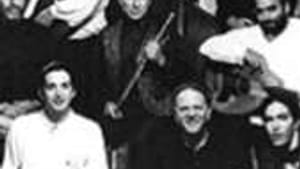Stay in the Loop
BSR publishes on a weekly schedule, with an email newsletter every Wednesday and Thursday morning. There’s no paywall, and subscribing is always free.
A musical solution for the Middle East
Atzilut: Jews and Arabs at Bryn Mawr

While war clouds darken the Middle East, a group of musicians in Bryn Mawr shared songs from that region in Arabic, Hebrew and Ladino.
Atzilut is an ensemble featuring Arab and Jewish musicians with vocals, flute, oud, bass and an assortment of percussion instruments. This harmonious partnership is led by Jack Kessler— a cantor and guitar player with a powerful baritone voice— and Maurice Chedid, a Lebanese composer and virtuoso on the oud who possesses a reed-like singing voice.
I was reminded of Daniel Barenboim's multicultural Western-Eastern Divan Orchestra, which he co-founded with the Palestinian scholar Edward Said. "When musicians share the same note," Barenboim observed, "they share something intimate regardless of their cultural or ethnic backgrounds. Music can provide and bring the condition of curiosity between peoples."
The Atzilut musicians certainly would agree. A major difference is that Barenboim and Said made many political pronouncements; Atzilut insists that its music is its message.
The lyrics stress companionship and love of God, and the audience would have benefited if translated words could have been projected on a screen. Atzilut had CDs available, but its act would come across even better on video, especially with captions.
In any case, it's a high-energy performing group. Some members of the excited outdoor audience started dancing; others clapped along.
Although it's commonly labeled a Middle Eastern group, Atzilut draws on wider sources, like the Moors of North Africa and the Sephardic Jews of Spain.
Opening act for Atzilut was the Wayne Rangers, another group that embraces disparate cultures— in their case, klezmer and bluegrass. Attorney Mark Schultz, the group's leader and vocalist, says he doesn't look for deep connections between the two musical genres; he merely enjoys both. Warmth and joy emanate from the songs they performed, like "The Kentucky Waltz," by the bluegrass pioneer Bill Monroe, "Russian Lullaby," by Irving Berlin, and "Shalom Aleichem," from the Jewish liturgy.
Its instruments are fiddle, guitar, banjo, mandolin and bass. As with Atzilut, the Wayne Rangers offered no speeches— just infectious entertainment.
Atzilut is an ensemble featuring Arab and Jewish musicians with vocals, flute, oud, bass and an assortment of percussion instruments. This harmonious partnership is led by Jack Kessler— a cantor and guitar player with a powerful baritone voice— and Maurice Chedid, a Lebanese composer and virtuoso on the oud who possesses a reed-like singing voice.
I was reminded of Daniel Barenboim's multicultural Western-Eastern Divan Orchestra, which he co-founded with the Palestinian scholar Edward Said. "When musicians share the same note," Barenboim observed, "they share something intimate regardless of their cultural or ethnic backgrounds. Music can provide and bring the condition of curiosity between peoples."
The Atzilut musicians certainly would agree. A major difference is that Barenboim and Said made many political pronouncements; Atzilut insists that its music is its message.
The lyrics stress companionship and love of God, and the audience would have benefited if translated words could have been projected on a screen. Atzilut had CDs available, but its act would come across even better on video, especially with captions.
In any case, it's a high-energy performing group. Some members of the excited outdoor audience started dancing; others clapped along.
Although it's commonly labeled a Middle Eastern group, Atzilut draws on wider sources, like the Moors of North Africa and the Sephardic Jews of Spain.
Opening act for Atzilut was the Wayne Rangers, another group that embraces disparate cultures— in their case, klezmer and bluegrass. Attorney Mark Schultz, the group's leader and vocalist, says he doesn't look for deep connections between the two musical genres; he merely enjoys both. Warmth and joy emanate from the songs they performed, like "The Kentucky Waltz," by the bluegrass pioneer Bill Monroe, "Russian Lullaby," by Irving Berlin, and "Shalom Aleichem," from the Jewish liturgy.
Its instruments are fiddle, guitar, banjo, mandolin and bass. As with Atzilut, the Wayne Rangers offered no speeches— just infectious entertainment.
What, When, Where
Atzilut and The Wayne Rangers. July 21, 2012 at Bryn Mawr Gazebo, 9 S. Bryn Mawr Ave., Bryn Mawr, Pa. (866) 468-7619 or www.brynmawrtwilightconcerts.com.
Sign up for our newsletter
All of the week's new articles, all in one place. Sign up for the free weekly BSR newsletters, and don't miss a conversation.

 Steve Cohen
Steve Cohen